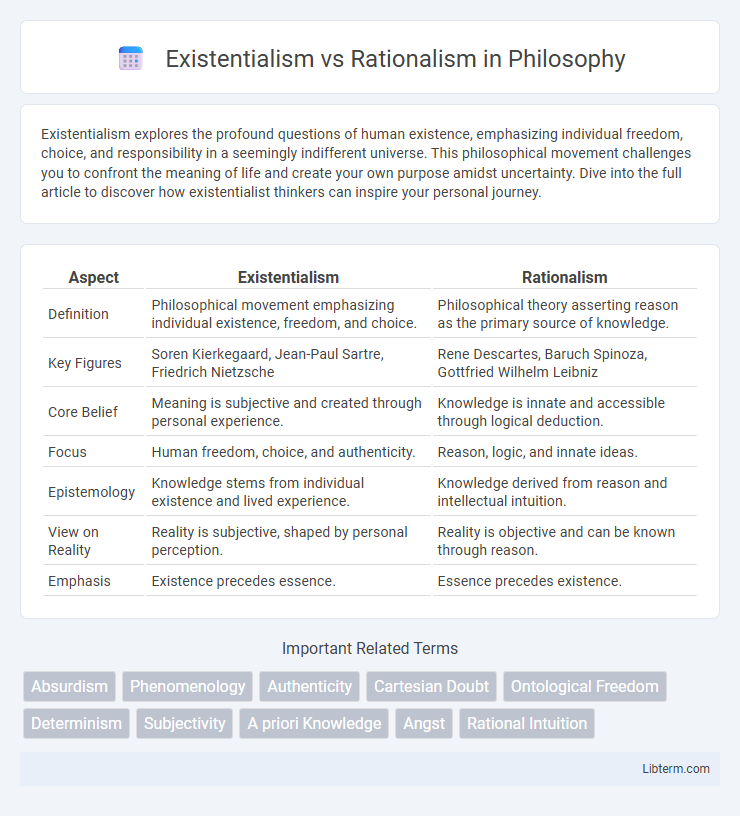Existentialism explores the profound questions of human existence, emphasizing individual freedom, choice, and responsibility in a seemingly indifferent universe. This philosophical movement challenges you to confront the meaning of life and create your own purpose amidst uncertainty. Dive into the full article to discover how existentialist thinkers can inspire your personal journey.
Table of Comparison
| Aspect | Existentialism | Rationalism |
|---|---|---|
| Definition | Philosophical movement emphasizing individual existence, freedom, and choice. | Philosophical theory asserting reason as the primary source of knowledge. |
| Key Figures | Soren Kierkegaard, Jean-Paul Sartre, Friedrich Nietzsche | Rene Descartes, Baruch Spinoza, Gottfried Wilhelm Leibniz |
| Core Belief | Meaning is subjective and created through personal experience. | Knowledge is innate and accessible through logical deduction. |
| Focus | Human freedom, choice, and authenticity. | Reason, logic, and innate ideas. |
| Epistemology | Knowledge stems from individual existence and lived experience. | Knowledge derived from reason and intellectual intuition. |
| View on Reality | Reality is subjective, shaped by personal perception. | Reality is objective and can be known through reason. |
| Emphasis | Existence precedes essence. | Essence precedes existence. |
Introduction to Existentialism and Rationalism
Existentialism emphasizes individual freedom, subjective experience, and the inherent meaninglessness of life, urging individuals to create their own purpose through authentic choices. Rationalism asserts that reason and innate knowledge are the primary sources of understanding, relying on logical deduction rather than sensory experience to attain truth. Key figures include Jean-Paul Sartre for Existentialism and Rene Descartes for Rationalism, highlighting contrasting approaches to human knowledge and existence.
Historical Origins of Existentialism
Existentialism emerged in the 19th and 20th centuries as a philosophical movement emphasizing individual freedom, subjectivity, and the search for meaning in an absurd world, with key figures such as Soren Kierkegaard and Friedrich Nietzsche laying its groundwork. It originated as a reaction against the deterministic approach of Rationalism, which prioritized reason and universal truths derived from intellect and logic, exemplified by Rene Descartes and Immanuel Kant. Existentialism's historical roots lie in a critique of Enlightenment rationality, highlighting human experience, anxiety, and authenticity over abstract reasoning.
Foundations of Rationalist Philosophy
Rationalist philosophy is grounded in the belief that reason and innate knowledge serve as the primary sources of understanding reality, emphasizing deductive logic and a priori concepts. Foundational figures such as Rene Descartes, Baruch Spinoza, and Gottfried Wilhelm Leibniz contributed to this framework by asserting that certain truths are accessible independently of sensory experience. This contrasts with existentialism, which prioritizes individual existence, freedom, and subjective experience over objective rational structures.
Key Thinkers: Existentialism vs Rationalism
Existentialism, championed by key thinkers such as Jean-Paul Sartre, Soren Kierkegaard, and Friedrich Nietzsche, emphasizes individual freedom, choice, and subjective experience as the core of human existence. In contrast, Rationalism, represented by philosophers like Rene Descartes, Baruch Spinoza, and Gottfried Wilhelm Leibniz, prioritizes reason and innate knowledge as the primary sources of understanding reality. These contrasting philosophies highlight the tension between subjective human experience and objective rational thought in the quest for meaning and truth.
Core Principles of Existentialism
Existentialism centers on individual freedom, personal responsibility, and the subjective experience of existence, emphasizing that humans create their own meaning in an inherently meaningless world. It challenges the deterministic and objective frameworks of Rationalism, which relies on reason and logic as the primary sources of knowledge. Key existentialist thinkers like Jean-Paul Sartre and Soren Kierkegaard highlight authenticity and angst as fundamental to human existence.
Fundamental Tenets of Rationalism
Rationalism asserts that reason and innate knowledge are the primary sources of understanding reality, emphasizing logic and deductive reasoning over sensory experience. It holds that certain truths, such as mathematical and metaphysical principles, are a priori and can be known independently of empirical observation. This philosophical approach contrasts with existentialism, which centers on individual experience, freedom, and subjective meaning rather than objective rational structures.
Approaches to Human Existence
Existentialism emphasizes individual experience, freedom, and authenticity, asserting that humans create their own meaning despite an absurd or indifferent universe. In contrast, Rationalism relies on reason and innate knowledge as the primary tools for understanding human existence and the nature of reality. These approaches diverge in valuing subjective personal choice versus objective logical deduction in defining human life.
Reason vs Subjective Experience
Existentialism emphasizes subjective experience as the primary source of meaning, asserting that individuals create their own essence through choices and emotions. Rationalism prioritizes reason and logic as the foundation for knowledge, advocating that truth can be discovered through intellectual deduction independent of personal feelings. The tension between these philosophies highlights the debate between objective reasoning and the intrinsic value of personal, lived experience.
Influence on Modern Philosophy
Existentialism, with key figures like Jean-Paul Sartre and Soren Kierkegaard, profoundly shaped modern philosophy by emphasizing individual freedom, subjective experience, and the inherent meaninglessness of life. Rationalism, championed by philosophers such as Rene Descartes and Baruch Spinoza, influenced modern thought by prioritizing reason, logic, and innate knowledge as foundations for understanding reality. The ongoing dialogue between existentialist stress on personal meaning and rationalist commitment to universal truths continues to drive contemporary debates in epistemology and ethics.
Conclusion: Bridging Existentialism and Rationalism
Bridging Existentialism and Rationalism involves recognizing the complementary nature of subjective human experience and objective reasoning. Existentialism emphasizes individual freedom, angst, and authentic existence, while Rationalism prioritizes logic, knowledge, and universal truths. Integrating both philosophies fosters a holistic understanding that values personal meaning alongside rational analysis, enriching ethical decision-making and personal growth.
Existentialism Infographic

 libterm.com
libterm.com